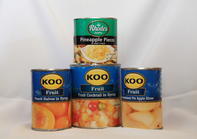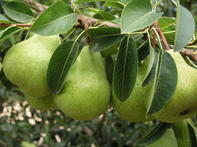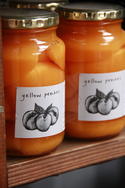The South African Fruit and Vegetable Canners Association was founded in January 1954.

The association is comprised of 20 members to represent the deciduous fruit, pineapple, vegetable and tomato sectors. The main canning fruit produced in South Africa are peaches, apricots, pears, guavas and pineapples.
Canning Fruit Production Regions

The South African pineapple industry is small in global terms, with one farmer in the Eastern Cape currently accounting for almost 70% of South Africa’s total production.
Pineapples are also produced in KwaZulu-Natal. The industry suffered a severe blow in 2007 after traces of cadmium were found in a shipment of pineapples to Europe, resulting in all farmers sitting without a market for their produce.
The contamination was linked to a handful of farmers, who unknowingly used a fertiliser containing this heavy metal.
South Africa is the largest exporter of canned apricots, accounting for about a third of the world’s exports. Most of these apricots are produced in the Klein Karoo of the Western Cape.
Producers, however, had to dump about 5 000 tons of Bulida apricots and uproot many trees when the industry ran into an oversupply during the 2013/2014 production season.
Most of South Africa’s canning pears and peaches are also produced in the Western Cape, while guavas are produced in the Western Cape, Mpumalanga and Limpopo.
Sales
The canning industry is extremely competitive and capital intensive, resulting in only a handful of international processors dominating the market.
South African producers usually have a medium to long term delivery contract with one of three processors who operate in the country. These processors export more than 80% of the country's canned fruit across the world, from Europe to the Far East.
Usage

Canned fruit may be enjoyed as a snack, used for cooking, baking or desserts. Canned fruit and vegetables are high in dietary fibre and research by the University of Illinois’ Department of Food Science and Human Nutrition in the USA has found that it is just as fresh as their fresh counterparts.
The study was expanded and updated in 1997. The new study, The Nutrient Conservation in Canned, Frozen and Fresh Foods, analysed the nutritional status of 35 canned fruit and vegetables, as well as fish.
Fruits included in the study were apples, apricots, blackberries, blueberries, grapefruit, mandarin oranges, peaches, pears, pineapple, plums, strawberries, cherries, stewed and whole tomatoes as well as olives.
The vegetables included asparagus, beets, carrots, corn, green beans, mushrooms, peas, pumpkin, spinach, sweet potatoes, and white potatoes.
Other studies have, however, concluded that the heating process destroys certain nutrients, such as vitamin C and folic acid, as well as antioxidants.